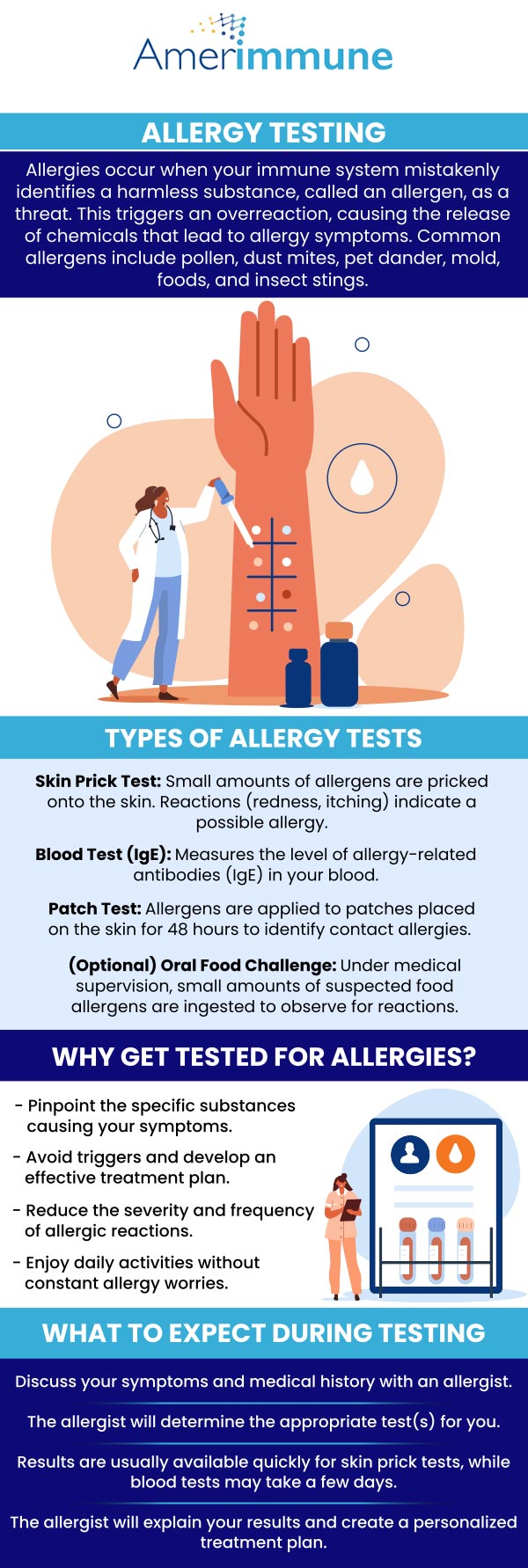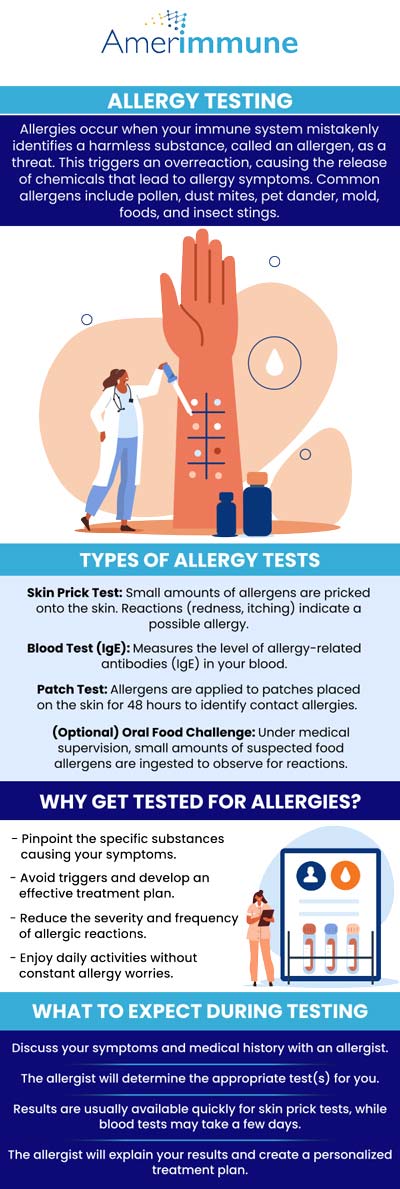Allergy Testing Specialist in McLean VA
At Amerimmune Clinic, we provide thorough allergy testing to help pinpoint the specific allergens causing your symptoms. Whether you’re dealing with seasonal allergies, food sensitivities, or environmental triggers, our team uses the latest testing methods to offer accurate results. For more information, contact us or appointment online. We are conveniently located at 8260 Greensboro Drive Suite A-15 McLean, VA 22102.


Table of Contents:
How accurate are allergy tests?
What age is appropriate for allergy testing?
Can medications affect allergy test results?
What is the difference between skin prick and blood allergy tests?
At Amerimmune Clinic, we understand that accurate allergy testing and diagnosis are essential to effectively manage and treat allergic conditions. Allergy tests are generally reliable diagnostic tools that help us pinpoint the specific substances causing your allergic reactions. However, the accuracy of these tests can vary based on the type of test administered and individual patient factors.
We commonly utilize skin prick tests, which deliver rapid and precise results for detecting environmental and food allergens. By introducing tiny amounts of allergens into the skin, these tests measure immediate allergic responses, helping our specialists quickly identify triggers. While skin prick tests are highly accurate in most cases, occasional false positives—where the test indicates an allergy that isn’t truly present—may occur. False negatives, in which an existing allergy goes undetected, are less common but can also happen.
In situations where skin prick testing isn’t feasible due to skin conditions, medication use, or other individual factors, Amerimmune Clinic offers allergen-specific IgE antibody blood tests. These blood tests are a reliable alternative and typically correlate well with skin test results, particularly for inhalant allergens such as pollen, dust mites, and pet dander. Nonetheless, blood tests can also produce occasional false-positive or false-negative results, especially when it comes to certain foods or less common allergens.
Accuracy can also vary depending on the allergen itself. Tests for inhalant allergens—such as pollen, mold, dust mites, and pet dander—generally provide highly accurate results. Food allergy tests, however, often require careful clinical interpretation and may sometimes need additional evaluation through oral food challenges to confirm a definitive diagnosis. At Amerimmune Clinic, our experienced allergists and immunologists carefully review each patient’s test results alongside medical history, physical exam findings, and clinical symptoms to ensure accurate allergy diagnosis and optimal management strategies.
Ultimately, accurate allergy diagnosis depends on a comprehensive approach. At Amerimmune Clinic, our board-certified allergists and immunologists are committed to providing personalized care, ensuring you fully understand your allergy test results, and helping you navigate the best possible treatment plan.
At Amerimmune Clinic, allergy testing is a key part of our approach to immune system health and wellness. Testing can be performed at nearly any age, with specialists evaluating each patient’s unique circumstances and symptoms to choose the right methods.
We often recommend testing for infants and young children showing severe allergy symptoms like chronic congestion, recurrent infections, or asthma-like signs. Early identification of allergens helps parents manage symptoms and prevent reactions, improving quality of life.
Our clinic uses advanced, accurate allergy tests tailored to each patient’s age and stage of development. Skin prick testing is commonly performed, even in young children, by our experienced allergists. We understand that interpreting results in younger patients requires expert judgment, as there can be occasional false positives or negatives.
For older children, adolescents, and adults with symptoms like nasal congestion, itchy eyes, or chronic cough, allergy testing can significantly improve their quality of life. We also focus on adults who recently developed allergy-like symptoms and recommend timely consultation.
Amerimmune Clinic takes a personalized, patient-centered approach, carefully reviewing medical histories and symptoms to determine the best testing protocol. If you or a loved one experiences persistent symptoms, we encourage a consultation with our specialists.
At Amerimmune Clinic, we frequently perform allergy testing—including skin prick and intradermal tests—to identify specific allergens triggering your immune system. These tests rely upon a clear, unaltered immune response, typically seen as skin reactions like redness, swelling, or itching. However, certain medications can significantly impact your test results by suppressing or changing your body’s natural reaction, potentially leading to inaccurate or misleading outcomes.
Common medications that interfere with allergy testing include:
Antihistamines
Antihistamines reduce allergic reactions by blocking histamine, a chemical released by your immune system during allergic episodes. If antihistamines are in your system during testing, they can significantly diminish or even eliminate positive test responses.
Corticosteroids
Corticosteroids—including oral steroids, topical creams, nasal sprays, inhalers, and steroid injections—also suppress inflammation and allergic reactions. These medications can decrease skin sensitivity during testing, potentially causing false-negative results.
Immunosuppressive Medications and Certain Antidepressants
Immunosuppressants, certain antidepressants (such as tricyclic antidepressants), and other medications may affect your immune system’s responsiveness or block chemical pathways involved in allergic reactions.
Next Steps for Accurate Allergy Testing
Before scheduling your allergy test, please provide your healthcare provider at Amerimmune Clinic with a complete list of medications, supplements, and herbal remedies you currently use. Our specialists will carefully review your medication history and may ask you to temporarily discontinue certain medications or suggest alternative testing methods unaffected by medication use.
Skin prick testing, commonly performed at Amerimmune Clinic, involves placing small amounts of allergen extracts onto the patient’s skin—usually on the forearm or back—to pinpoint specific allergic triggers. Our allergists gently prick or scratch the skin’s surface, allowing allergens to penetrate slightly. If an allergy is present, a raised area or “wheal” will typically appear within 15-20 minutes. This method provides immediate results, is minimally invasive, cost-effective, and enables simultaneous testing of multiple allergens. However, skin prick testing may require temporarily pausing antihistamine medications beforehand and carries a small risk of mild to moderate allergic reactions, though our experienced medical team closely monitors patients to ensure their safety and comfort.
Alternatively, Amerimmune Clinic offers advanced blood allergy tests. Blood tests involve collecting a blood sample that our specialized laboratory carefully analyzes to identify allergen-specific immunoglobulin E (IgE) antibodies. This approach is ideal for patients who cannot discontinue antihistamines, have extensive skin conditions, have experienced severe allergic reactions previously, or are very young children. Blood tests do not carry the risk of allergic reactions, are unaffected by medication use, and can be performed safely regardless of the patient’s age or medical history. However, results typically take several days to receive, may incur slightly higher costs, and can sometimes be slightly less sensitive compared to skin prick tests.
At Amerimmune Clinic, our goal is to deliver precise, personalized allergy diagnosis and treatment planning, empowering our patients to achieve long-term relief and improved quality of life. For more information, contact us or appointment online. We are conveniently located at 8260 Greensboro Drive Suite A-15 McLean, VA 22102. We serve patients from McLean VA, Vienna VA, Idylwood VA, Falls Church VA, Tysons VA, and surrounding areas.

Additional Services You May Need
▸ Allergy Consultation
▸ Immunology Consultation
▸ Allergen Immunotherapy
▸ Allergy Vials
▸ Allergy Shots
▸ Biological Drug Administration
▸ Diagnostic Testing
▸ Skin Prick Testing
▸ Allergy Patch Testing
▸ Oral Food Challenge Testing
▸ Nasal Swab Culture Testing
▸ Phlebotomy
▸ Telehealth
▸ Immunology Testing
▸ Food Allergy Testing
▸ Asthma

Additional Services You May Need
▸ Allergy Consultation
▸ Immunology Consultation
▸ Allergen Immunotherapy
▸ Allergy Vials
▸ Allergy Shots
▸ Biological Drug Administration
▸ Diagnostic Testing
▸ Skin Prick Testing
▸ Allergy Patch Testing
▸ Oral Food Challenge Testing
▸ Nasal Swab Culture Testing
▸ Phlebotomy
▸ Telehealth
▸ Immunology Testing
▸ Food Allergy Testing
▸ Asthma

